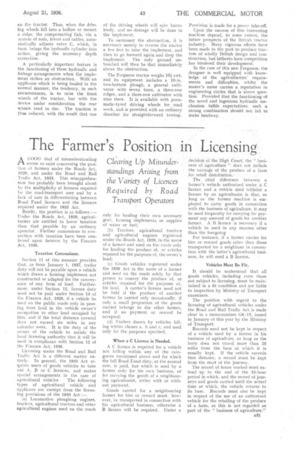The Farmer's Position in Licensing
Page 45

If you've noticed an error in this article please click here to report it so we can fix it.
A GOOD deal of misunderstanding
seems to exist concerning the position of farmers under the Roads Act, 1920, and under the Road and Rail Traffic Act, 1933. This misapprehension has probably been brought about by the multiplicity of licences required by the road-transport user and by a lack of care in differentiating between Road Fund licences and the licences required under the 1933 Act.
Briefly, the position is as follows:— Under the Roads Act, 1920, agriculturists are entitled to lower taxation than that payable by an ordinary operator. Further concessions in connection with taxation have been conferred upon farmers by the Finance Act, 1936.
Taxation Concessions.
Section 11 of this measure provides that, as from January 1, 1937, trailer duty will not be payable upon a vehicle which draws a farming implement not constructed or adapted for the conveyance of any form of load. Furthermore, under Section 12, licence duty need not be paid under Section 13 of the Finance Act, 1920, if a vehicle be used on the public roads only in passing from land in the vehicle owner's occupation to other land occupied by him, and if the total distance covered does not exceed six miles in any calendar week. It is the duty of the owner of the vehicle to satisfy the local licensing authority that it will be used in compliance with Section 12 of the Finance Act, 1936.
Licensing under the Road and Rail Traffic Act is a different matter entirely. In general, the 1933 Act requires users of 'goods vehicles to take out A, B or C licences, and makes special arrangements in the case of agricultural vehicles The following types of agricultural vehicle • and appliance are exempt from the licensing provisions of the 1933 Act:- (a) Locomotive ploughing engines, tractors, agricultural tractors and other agricultural engines used on the roads only for hauling their own necessary gear, farming implements or supplies of water or fuel; (b) Tractors, agricultural tractors and agricultural engines registered under the Roads Act, 1920, in the name of a farmer and used on the road § only for hauling the produce of, or articles required for the purposes of, the owner's land; (c) Goods vehicles registered under the 1920 Act in thc name of a farmer and used on the roads solely by that person to convey the produce of, or articles required for the purposes of, his land. A carrier's licence need not be held if the produce of another farmer be carried only occasionally, if only a small proportion of the goods carried belongs to the other farmer, and if no payment or reward be accepted; (d) Trailers drawn by vehicles falling within classes a, b and c, and used only for the purposes specified.
When a C Licence is Needed.
A C licence is required for a vehicle not falling within any of the categories mentioned above and for which the full Road Fund dirty, at the normal rate, is paid, but which is used by a farmer only for his own business, or for carrying the goods of a neighbouring agriculturist, either with or without payment.
Goods carried for a neighbouring farmer for hire or reward must, however, be transported in connection with his agricultural business, otherwise a B licence will be required. Tinder a clecisioh Of the High Court, the ''business of agriculture " doek not include the 'carriage of the produce of a farm for .retail distribiition.e The chief difference between a farmer's vehicle authorized under a C licence and a Vehitle IcSed Withdut a licence by an agriculturist is that, so long as the former machine is employed to ,carry goods in connection with the business of agriculture, it may be used frequently for carrying for payment any amount of goods for another farmer. A B licence is necessary if a vehicle be used in any manner other than the foregoing For instance, if a farmer carries for hire or reward goods other than those transported for a neighbour in connection with the latter's agricultural busi ness, he will need a B licence. • Vehicles Must Be Fit.
It should be understood that all goods vehicles, including even those not subject to licensing, must be maintained in a fit condition and are liable to inspection by Ministry of Transport examiners.
The position with regard to the licensing of agricultural vehicles under the Road and Rail Traffic Act is made clear in a memorandum G6/12, issued in January of this year by the Ministry of Transport.
Records need not he kept in respect of a vehicle used by a farmer in his business of agriculture, so long as the lorry does not travel more than 25 miles from the base at which it is usually kept. If the vehicle exceeds that distance, a record must be kept from the start of the journey.
The record of hours worked must extend up to the end of the 24-hour period in which, and the record of journeys and goods carried until the actual time at which, the vehicle returns to its base. Records must also be kept in respect of the use of an authorized vehicle for the retailing of the produce of a farm, as this is not regardea as part of the `! business of agriculture.'.'




























































































